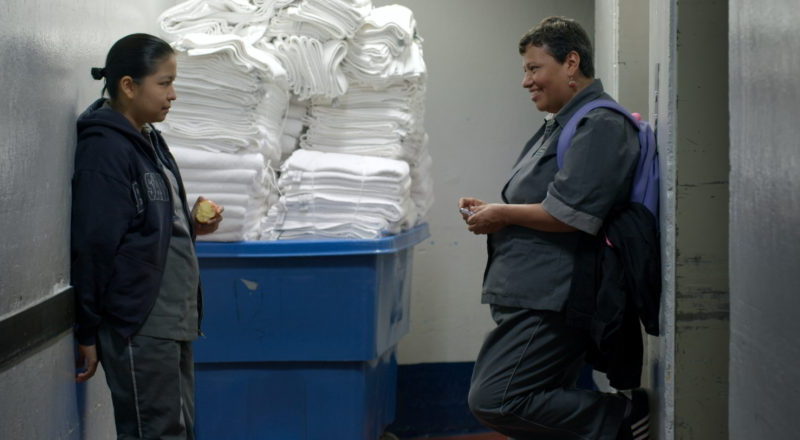INTERVIEW: ‘Chambermaid’ offers timely commentary on class and labor
Photo: The Chambermaid stars, from left, Gabriela Cartol and Teresa Sánchez. Photo courtesy of Kino Lorber / Provided by press site with permission.
The Chambermaid, the new movie from first-time director Lila Avilés, is a touching portrait of a young chambermaid named Eve who works at a wealthy hotel in Mexico City. While she cleans the rooms of the hotel, Eve is unable to care for her own child, one of the many sacrifices she must make in order to survive.
While Eve (Gabriela Cartol) works shift after shift, she begins to imagine the lives of the hotel’s clientele, sometimes even vicariously living through them by inspecting their belongings and daydreaming about the future.
Avilés’ film, which was partly inspired by Sophie Calle’s art project, The Hotel, recently had a celebrated run at New York City’s Film Forum, and a national rollout is ongoing, thanks to Kino Lorber. Recently Hollywood Soapbox exchanged emails with the director. Questions and answers have been slightly edited for style.
How were you inspired by Sophie Calle’s art project, The Hotel?
I saw the book a long time ago, and I thought it was incredible to imagine people’s lives from their trash and belongings. Then I made a play that doesn’t have anything to do with the film — but that’s the beautiful thing, how things change if you start to develop more and more.
What was it like working with Gabriela Cartol?
Gaby is magnificent; she was the key. She is a really good human being and a very intuitive actress.
Many critics have pointed out the minimalism and realism of the movie. When did you settle on these styles? Early in the process?
The film developed very organically. I wanted [to create] a feeling of being real and have a strong creative team by my side. Carlos Rossini, the DP, comes from documentary; Omar Guzman, the editor, also comes from that side; and the final part came from Guido Berenblum, the sound designer. We made all the sound design without any music.
What do you feel the movie says about class and economic reality in Mexico City and the world?
In Mexico, the economics are truly divided; it is the reality of every single employment situation. I think this is the Latin American phenomenon, but people are still happy and united.
Was it a difficult production? Was the budget and schedule very tight?
Everything was difficult in terms of production. It really is an indie film. We only had 17 days for filming, one month to make a rough assembly for getting more funds for co-production, in the middle of a terrible earthquake in 2017, but we accomplished the financial part in order to finish the film in the manner I wanted it to be. For the next film, the thing I really want is to have time for filming.
This being your debut feature, what did you like about the filmmaking process?
I think that the first one, as with everything, is something you never repeat. You … have more in your hands than just trying to do what your intuition and your passion tells you to do, and, of course, over time, you start to understand more and more the cinematic style you want to achieve. I have some friends that are directors, and they say that the second film is the hard one. I think it is always difficult because you never know. But what I’ll try to do in my career as a filmmaker is to try and catch the vibe of every film and to remain as honest as possible to the main theme of every story.
By John Soltes / Publisher / John@HollywoodSoapbox.com
The Chambermaid, directed by Lila Avilés, is currently being released throughout the United States by Kino Lorber. Click here for more information.

